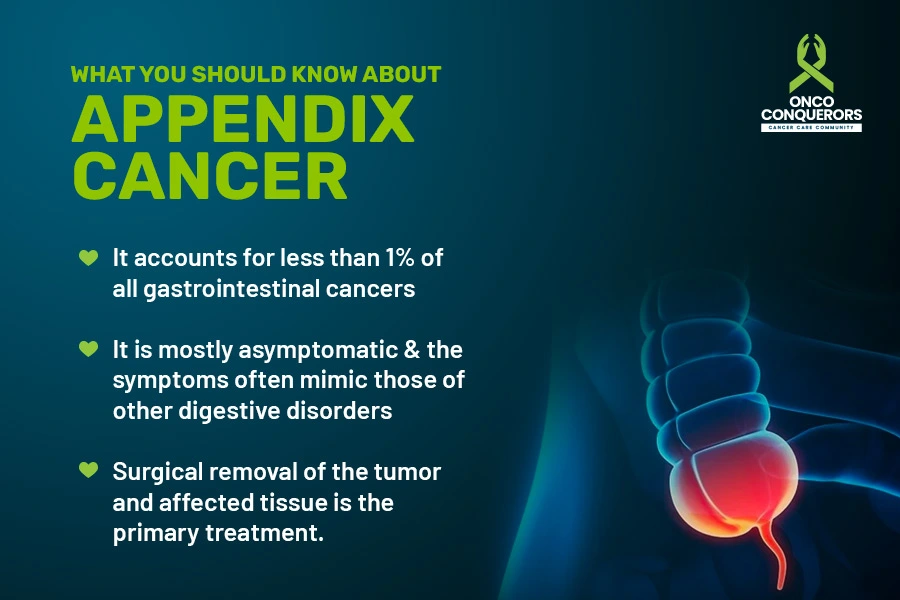The appendix is a small tissue pouch in our abdomen. It is a part of the gastrointestinal tract (GI) that absorbs nutrients and eliminates waste from the body.
Appendix cancer, also known as appendiceal cancer, is a rare cancer that develops when healthy cells in the appendix grow and multiply abnormally. There are different types of tumors that can start in the appendix:
1. Neuroendocrine tumour: This tumour originates in the hormone-producing cells present in our body. Appendix Neuroendocrine tumours are commonly found at the tip of the appendix.
2. Colonic-type adenocarcinoma: These tumours generally form near the appendix’s base and have symptoms similar to colorectal cancer tumours.
3. Appendiceal mucoceles: Mucoceles are appendix wall swellings and can occur from benign to malignant conditions in the appendix.
4. Signet-ring cell adenocarcinoma: This is termed so, as under the microscopic view, the cell appears to have a signet ring.
5. Goblet cell carcinomas: This type of appendix cancer has features of both adenocarcinomas and neuroendocrine tumours. They are more aggressive than neuroendocrine tumours, and treatment is often similar to treatment for adenocarcinoma.
6. Paraganglioma: This is a rare tumour that develops from cells of the paraganglia, a collection of cells that come from nerve tissue that remain in small deposits after fetal development.

Risk factors of appendix cancer
Certain risk factors may trigger appendix cancer, these include.
-
The risk of this cancer increases as we age.
-
Women are more likely than men to develop appendix cancer.
-
Certain health conditions, including atrophic gastritis and pernicious anaemia, may increase an individual’s risk for appendix cancer.
-
Smoking or using tobacco products can increase the chances of all cancers, including appendix cancer.
What are the signs of appendix cancer?
Symptoms of appendix cancer may vary from person to person. The symptoms may appear to be disguised as common ailments; therefore, one must be cautious about these symptoms and consult a doctor immediately. The symptoms of this cancer type include:
-
Bloating: Feeling bloated frequently, or noticing a swelling near the abdominal area, may sometimes be an indication of appendix cancer. There are no apparent symptoms of appendix cancer until it spreads to the nearby area or other organs. Apart from bloating, in some cases, protrusion of the belly button may surface as a symptom.
-
Vomiting: Frequent incidents of nausea and vomiting are classic symptoms of appendix cancer. And it is worse once the cancerous cells have spread to other parts of the body beyond the appendix.
-
Appendicitis: One of the most significant warning signs of Appendix cancer is Appendicitis. It is generally characterized by painful swelling of the appendix. Appendicitis may appear from an infection. If untreated, it may lead to the bursting of the appendix. However, it is not necessary that all Appendicitis patients may develop appendix cancer.
-
Loss of appetite: Appendix cancer may lead to a loss of appetite, and the patient may feel full, even after eating a small amount.
-
Ovarian masses: In women, the beginning of appendix cancer may be indicated by the formation of a pelvic mass. However, it may be mistaken for ovarian cancer. In case of any pelvic mass, a biopsy should be performed to examine the cells and obtain clarity about the nature of the tumour.
-
Changes in bowel function: Another significant warning sign of appendix cancer is changes in normal bowel functioning. As cancer grows, the tumour may cause intestinal discomfort, blockages, or changes to the body. This may include constipation, diarrhoea, or other unusual gastrointestinal symptoms.
-
Pain in the lower right abdomen: Localized appendix cancer may feel similar to Appendicitis, causing abdominal pain. This pain is often most severe in the lower-right section of the abdomen, where the appendix is located. But, in some cases, the pain may be stronger in the pelvic region.
-
New hernias: Hernias are often the first indicator of appendix cancer in men. A hernia develops when tissue or an organ bulge around the skin, in this case, in the abdominal area. When a patient has appendix cancer, the tumour may put pressure on the groin area, potentially leading to the development of a hernia.
-
Indigestion: Because appendix cancer may cause Appendicitis, patients may experience indigestion or other gastrointestinal symptoms. This is because patients with Appendicitis are known to have an increased prevalence of gastroesophageal reflux disease (GERD).
Many of the above symptoms of appendix cancer are also common indicators of acute Appendicitis and other medical conditions other than cancer. If patients notice any unexpected changes to their body, they should see a doctor to evaluate their symptoms.





